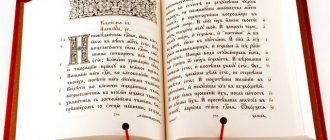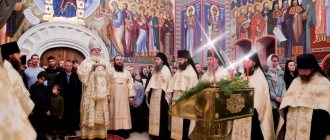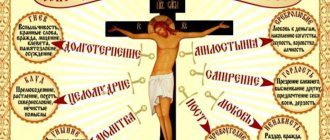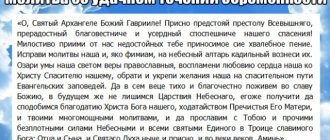In addition to the exclamation “Hallelujah!”, which means: “Praise God,” the prayer “Lord, have mercy!” - the shortest of all prayers in Orthodoxy. Its prototype is taken from the New Testament, where it appears three times.
In the Gospel of Mark, blind Bartimaeus on the road near Jericho, hearing Jesus Christ passing by, fearing that he would not notice him, the blind man, shouts loudly: “Jesus, Son of David! have mercy on me” (Mark 10:47), in the same way the unknown Canaanite woman turns to Christ, begging: “Have mercy on me, O Lord, Son of David, my daughter is cruelly enraged.” (Matthew 15:22), and for the third time this prayer sounds when Christ tells the parable of the publican and the Pharisee, and the sinful publican, standing in the distance, does not even dare to look at heaven and only asks: “Lord! Be merciful to me, a sinner!” (Luke 18:13).
It occurs no less than nine times in the psalms of King David, and in his prayers to God the Father it takes on a shorter form: “Have mercy on me, O Lord!” (Ps. 6:3, 9:14, 30:10, 40:11, 85:5) or “Lord! Have mercy on me!” (Ps. 40:5). Now the short form “Lord, have mercy” is just a stone’s throw away.
About prayer in the temple.
Come, man, to the house of God, lean in.
Maybe the word of the grace-filled prayer of the Apostolic Holy Church will fall on your soul. After all, church prayers, whether they are read or sung, contain the heartfelt feelings of the children saved by God. Their feelings should be ours too, because we need the same things that they needed when they lived on earth. They were saved from troubles and consoled in adversity by the grace of God. In their mouths she composed prayers pleasing to God. Each time a person leaves the temple calmer, better than when he entered. If anyone experiences fatigue, it is not like ordinary fatigue; it dissolves with an extraordinary feeling of sweetness.
Report by 1st year student of the Khabarovsk Theological Seminary Buzuk Andrey, read at the city scientific student conference “Russian language: history and modernity” 11/17/10.
The word of a living language - English, Russian, Chinese, any - carries the energy of action. And therefore, any name is not only and not so much a combination of sounds and grammatical structure. Any name contains a meaning that allows you to influence a person just by what is pronounced.
The story about bright people and their good deeds, a pure word, not clouded by doubt, irony, skepticism, leaves a feeling of purity in a person, just as warm summer rain washes the dusty glass of a window. An evil word inevitably gives rise to a feeling of catastrophe in a person’s soul, aggravating it with the burden of evil influence.
The word, therefore, is the deed. Since ancient times, people have used this property in religious and magical rituals, creating good and evil with words. Living languages can carry both evil and good energy in words and thereby deaden or spiritualize a person’s soul.
Here in Russia - in its Orthodox Church - we carefully preserve a language that carries only goodness. This language is Church Slavonic.
In the Church Slavonic texts of the Holy Scriptures - in the Gospel, the Psalter, in many spiritual creations created over a millennium in Byzantium and Rus', God is revealed.
The direct effectiveness of the good power of the Church Slavonic word has more than once been the cause of persecution of the Church Slavonic language, various reform movements insisting on replacing Church Slavonic worship with worship in Russian. A crafty idea is often introduced into the consciousness of Orthodox Christians that the Church Slavonic language is outdated, decrepit, dilapidated and incomprehensible, that it needs to be changed, brought closer to the Russian linguistic consciousness. The persecutors of the Church Slavonic language also say that Church Slavonic worship is incomprehensible to people who are just approaching Orthodoxy, that it rejects neophytes from the Church.
Let's answer it this way. Indeed, Church Slavonic is a very ancient language, more than a thousand years old. But this old man is not decrepit and weak, but wise and experienced and, most importantly, omnipotent in the matter of good. As for the neophytes, the Russians had already adopted the Church Slavonic language once - together with Orthodoxy under Vladimir Svyatoslavich the Baptist of Rus' in 988. Then, a thousand years ago, it was incomparably more difficult for them to understand it than for us now. The essence of Orthodoxy, as well as the Church Slavonic words denoting these essences, had to be comprehended again. After all, the ancient pagan Russians called their pagan gods “gods” and “saviors”; there were no such concepts as GRACE, GOOD, HOLY SPIRIT in the ancient Russian language... Even the words WRITE and READ had completely different meanings before the adoption of Orthodoxy with its book culture. WRITE meant to draw, READ meant just to say out loud.
The Russian people who accepted Orthodoxy in the 10th century had to ascend to it not only along the spiritual ladder, but also along the linguistic ladder. The Church Slavonic language, close and related to Old Russian, but sanctified by the Grace of the Holy Spirit, was the path of Russian knowledge of God. And this path was covered in just half a century.
Everyone knows the word “sin”, what does it mean?
If we were to poll our audience now, we can assume that the majority would answer that sin is a violation of the commandments, and this is indeed true. That is, it would be a piece of truth, but not the whole truth. In the legal Latin understanding, sin is a violation of the law, but in the Orthodox tradition we find a much more serious understanding of sin. Sin is a disease, it is a wound that I inflict on my soul. St. Isaac the Syrian, explaining what sin is, said: “A sinner is like a dog that licks a saw and does not notice the harm it causes to itself, getting drunk from the taste of its own blood.” This is an amazingly deep understanding of sin.
Sin is like a disease; sin makes us miserable rather than guilty. The fact is that we tear our soul into pieces, tear it away from God, rape it, mutilate it. In the Orthodox rite of confession, the priest turns to people and says to the person: “You came to the doctor’s hospital, so that you do not leave unhealed,” that is, the church considers itself a hospital to which sick people come. Not criminals, but sick, unfortunate people, that's the point. And they come with their wounds: “These are the wounds of our soul. Heal us."
There is one prayer that you all know, and in this prayer, in our opinion, all Orthodoxy is contained. This is the prayer “Lord have mercy!” This seemingly short prayer contains all of Orthodoxy. Now we will look at why.
The whole mystery is in the word “have mercy.” Have mercy from the word mercy, but in turn mercy is associated with the word “oil.”
And in the Greek language “Kyrie elaison” (Lord, have mercy) the word “elaison” comes from fir - oil. What is oil? This is the oldest medicine of humanity. This means wood oil, olive oil. This is the first medicine that a person encounters in the world.
The baby is born, he is smeared with oil so that there are no abrasions, overbreaks, etc. So, when I say: “Lord, have mercy!”, I don’t mean “Lord, forgive!”, I don’t mean “Lord , have mercy!”, I say: “Lord, here is my soul, it is all wounded. Let the oil of your mercy pour out on me and heal my soul, unite me again.”
So, this prayer has not been translated into any European language other than Church Slavonic. If you have heard the masses of Mozart, say, or Bach, the mass begins with “Kyrie elaison! Christy Elayson! The entire Mass is in Latin, but the first prayer is in Greek, because it cannot be translated, there is no such expression in Latin. “Forgive” is, “justify” is, but “have mercy” is something completely different.
In modern times, Orthodox Christians find themselves in such a situation. They serve in foreign countries in the local language: French, English, German, and it turned out that it was impossible to translate this elementary “Lord, have mercy!” into local languages is not possible. Well, let’s say in English “Lord, have mercy!” sounds “Lord have mercy!” Well, “mercy” actually doesn’t mean anything to an Englishman. This is a French word - please excuse me. In French, Dieu, aie pitié, aie pitié is pity: Have pity on us poor, unfortunate ones, give us a penny. This is completely different.
Sin is a disease, the Church is a hospital, sacrament is a medicine. John Chrysostom says so: “The sacrament of communion is the medicine of immortality.” The medicine of immortality that is given to a person is not some kind of symbol, it is not a duty, as in one Catholic book it is written: “It is the duty of a Christian to always receive communion.” No, it's not a debt, it's medicine. If we want our soul not to die, here is the Body of Christ. Come and taste it.
For us - Russian Orthodox people - the meaning of Church Slavonic words is like clean forest air after a polluted city. You can breathe this air deeply, you can inhale a little - each to its own measure - it’s still good!
The simplest words of the Church Slavonic language are raised to wondrous spiritual heights. Our daily bread is not just daily food. In Church Slavonic, Christ is called the bread of the belly—the bread of life. The CUP is not just a vessel that holds moisture, it is also a CUP OF SALVATION. Words describing human flesh, the habitually understandable face, eyes, lips in the Church Slavonic language also serve the cause of knowledge of God; they denote the immaterial actions of God, God's mercy and God's wrath, and the will of God given in revelations.
The high literature of the Church Slavonic language, the non-fussiness and unearthliness of the meanings of its words and the detachment from the living Russian grammatical forms of its grammar allow us to talk with God without fear of sacrilege or accidental insult to the Divine Name.
The word of the Church Slavonic language, unclouded and pure, carrying only goodness, must be preserved and protected, and not reformed in proud ardor. And so that there are more people who understand it, this word needs to be learned! And even though the new Church Slavonic reading may be unusual and not entirely clear to you at first, read and understand to your own extent. After all, the saving Psalm “Living in the help of the Most High” is still understood by many and called “Living Help,” and although the grammar is distorted in such an unwise perception, the essence is preserved: God’s living help descends on a person according to the word of this Psalm. It is important to know that the Church Slavonic language is inseparably linked with the path of Orthodox knowledge of God for Russians, that it is a guiding star on this path.
About the beginning of the teaching of prayer.
If someone says that he does not know how to pray, he must be told that he should study from the Holy Church, and for this purpose he would visit the churches of God as often as possible and stand in them with attention. They get used to praying little by little, starting with ready-made prayers, and then with zeal they acquire the gift of prayer from the Lord God.
About the providence of God. The Heavenly Father wants to show the wonders of His power, His greatness, His love and grace, to create man God-like, like Him, the Lord God. So that, having received strength from Him, to be strong, to receive grace, to be holy, to think and desire according to God’s will and to do everything in God’s way.
Blessing
God gave man a choice. He is free, reasonable, acts according to his own will and is responsible for his actions. A request for pardon provides protection from Higher powers if a person needs it and asks for it. As you know, Adam violated the commandment of God, thereby turning away from him. With the help of the Gospel, the procedure of baptism and Holy Communion, a person received everything he needed to receive heavenly grace. Only a person can decide whether to live in harmony with himself and the Higher Powers, or to turn away from them.
There is no compulsion in this case; the prayer book must come from a pure heart. Everyone has the choice to follow the path of salvation, but not everyone comes to it right away.
The text of the prayer reads as follows:
In Church Slavonic
“In the name of the Father, and the Son, and the Holy Spirit. Amen.
Glory to Thee, our God, glory to Thee. Heavenly King, Comforter, Soul of truth, Who is everywhere and fulfills everything, Treasure of good things and Giver of life, come and dwell in us, and cleanse us from all filth, and save, O Good One, our souls.
Holy God, Holy Mighty, Holy Immortal, have mercy on us (three times).
Glory to the Father, and the Son, and the Holy Spirit, now and ever, and unto ages of ages. Amen.
Most Holy Trinity, have mercy on us: Lord, cleanse our sins: Master, forgive our iniquities: Holy One, visit and heal our infirmities, for Thy name’s sake.
Lord, have mercy (three times).
Glory to the Father, and the Son, and the Holy Spirit, now and ever, and unto ages of ages. Amen.
Our Father, who art in heaven! Hallowed be Thy name, Thy kingdom come: Thy will be done as it is in heaven and on earth. Give us this day our daily bread: and forgive us our debts, as we forgive our debtors: and lead us not into temptation, but deliver us from the evil one.
For Thine is the kingdom, and the power, and the glory, of the Father, and the Son, and the Holy Spirit, now and ever, and unto ages of ages. Amen".
The Russian translation of the prayer “Have mercy” is:
“In the name of the Father, and the Son and the Holy Spirit. Amen.
Glory to Thee, our God, glory to Thee.
Heavenly King, Comforter, Spirit of Truth, Who is everywhere and fills everything, the source of blessings and the giver of life, come and dwell in us, and cleanse us from all filth and save, O Good One, our souls.
Holy God, Holy Mighty, Holy Immortal, have mercy on us (three times).
Glory to the Father, and the Son, and the Holy Spirit, both now (now) and ever (always). and forever and ever. Amen (truly so).
Most Holy Trinity, have mercy on us. Lord, cleanse our sins, Master, forgive our iniquities, Holy One, visit and heal our infirmities for Your name’s sake.
Lord, have mercy (three times).
Glory to the Father and the Son and the Holy Spirit, now and ever, and unto ages of ages. Amen.
Our Father who art in heaven. Hallowed be Thy name, Thy kingdom come, Thy will be done on earth as it is in heaven. Give us today our daily (necessary) bread, and forgive us our debts, as we forgive our debtors, and do not lead us into temptation, but deliver us from the evil one (the devil).
For (because) Thine is the kingdom, and the power, and the glory of the Father, and the Son, and the Holy Spirit, now and ever, and unto ages of ages. Amen".
About lessons about prayer.
Raise your soul from the earth to the Most Holy Trinity. The spirit must be elevated and the heart expanded so that it can accommodate the full breadth of the prayer “Lord, have mercy.”
Whatever happens - whether it is a miracle of God’s grace or a terrible measure of His punishment, in one case or another a person hastens to say: “Lord, have mercy.” This will express surprise at God’s mercy and recognition of His Glory and Holiness. At each service, a person, led by the clergy, repeats this prayer before the Lord. The heart must feel this prayer in connection with those petitions that are proclaimed by the priest of the altar of the Lord. The immense goodness of God confirms a person in prayerful boldness with a persistent request for the salvation of the soul.
Pray carefully
But both monks and priests warn self-confident neophytes against constantly performing Jesus’ prayer, since spiritually inexperienced people face many temptations that can lead them to even greater sins than those they have already committed. The most harmless thing can be a serious illness, which will turn the neophyte away from his exploits for a long time.
You can begin the Jesus Prayer only with the permission of your spiritual fathers. For the neophyte, the main thing is to read the morning and evening rules, where the Jesus Prayer occurs more than once, attend church on Sundays, regularly confess, take communion and remember that the short prayer “Lord, have mercy” sometimes contains the whole world.
In the collection “Unthought-out Stories about the Miraculous Help of God,” there is a story by one hieromonk about a miracle that happened to him in the army. He served as a paratrooper and jumped with a parachute, but his parachute did not open; didn't open up.
The soldier’s mother was a believer, and before leaving for the army, he received a prayer from her: the 90th Psalm “Alive in the help of the Above...” written on a piece of paper, which he sewed under the lining. But when the parachute lines got tangled, and the ground was getting closer every second, there was no time to climb for the piece of paper. The paratrooper shouted in fear: “Lord, have mercy!” - and God heard him: at that very moment the lines tightened and the reserve parachute opened its canopy.
About the teachings of the holy fathers on the Jesus Prayer.
If you want to be saved, pray unceasingly. To acquire the gift of unceasing prayer, a feat is needed. “The Kingdom of God requires, and those who force themselves delight Him.” It is worth training yourself through the Jesus Prayer in order to always be with the Lord. There is no such powerful weapon against the enemies of our salvation as prayer. Prayer is the seed that produces Christ in man; prayer is the power that fertilizes the life of Christ in human souls. If you cannot fast much and stand in prayer, so practice more in mental and heartfelt prayer. Above all, keep your lips from idle talk and condemnation, for nothing so impedes intellectual attention and warmth of heart.
About your own will and the will of the Lord. The will of man is always created with self-love. The will of the Lord is always good, wise, all-righteous, beneficial and can never sin.
About success in prayer.
It is worth thinking about the content of the prayer, understanding the meaning and, having thought about the content, memorize them. Then you can carry prayer within yourself. And no matter what the circumstances, the prayer book will always be with you. By memorizing prayers, a person will imprint deep prayerful feelings in himself. From such study a prayerful attitude is formed. It is worth preparing for prayer - stand silently for a while to calm your feelings. Attention should be given only to the matter of prayer. We must feel ourselves in the presence of God, be in reverent fear. The heart must believe that the Lord sees and hears everyone. You are not allowed to rush in prayer; all prayers must be said with patience to the end.
About short prayers.
Prayer performed with the mind and heart takes possession of a person. If prayer always abides within the person praying, then the thought of God inseparably abides with him. Concentration precedes internal prayer work; it must be an unchanging state of a person’s spirit. Then there will be unceasing prayer in him. Short prayers allow you not to wander into vain thoughts and thoughts, but allow prayer to be in your heart all the time, keep your thoughts on God, and keep your attention focused.
About the Jesus Prayer.
The Jesus Prayer unites the soul with the Lord and leads to communion with God. The beginning of the habit of constant prayer is its frequent repetition with attention in the heart. Frequent repetitions bring the mind together in coming to the Lord. To cultivate this skill in yourself, you must first repeat this prayer several times at the beginning and at the end of the prayer rule. The number of repetitions can be determined independently or on the advice of a confessor. You need to worry not about words and the number of repetitions, but so that the mind is in the heart and stands before the Lord, with full consciousness of His greatness, grace, and truth.
About ways to success in the skill of prayer. You must keep your body strictly in food, in sleep, and in rest. You must guard your feelings - protect your eyes and ears, tie your tongue. Just as a candle cannot burn in the rain, so prayer cannot thrive in the presence of external impressions.
Monks' prayer
The Jesus Prayer has several forms: “Lord, Jesus Christ, Son of God, have mercy on me, your sinful servant (name),” and “Lord, Jesus Christ, have mercy on me,” or “Lord, Jesus Christ, our God, have mercy on me, a sinner.” "
Most often, monks say the Jesus Prayer - they repeat it incessantly until their soul and mind rush to God. In rare cases, the elders blessed the laity for such prayer. The elder from Optina Pystyna, the Venerable Barsanuphius, taught that by praying in this way, a person remembers God every second.
He divided the monk’s prayer into four stages: he called the first stage the labor stage, at this stage the person’s mind quickly becomes distracted from the prayer and forgets about it, and then the monk has to use all his strength to repeat it all the time. But even this is useful, since the mind is tuned to repentance.
The second stage is prayer of the mind, intelligent, when a person’s mind, heart and feelings pray, the prayer occurs as if by itself and does not fall silent. Rev. Anatoly (Zertsalov) pointed out that “Our main effort is to enclose our minds in the words: “Lord Jesus Christ, Son of God, have mercy on me, a sinner.”
The third stage of prayer is when it becomes creativity, and an Orthodox Christian can move rocks with his word. Only rare hermits and hermits achieve such prayer. And finally, the fourth stage of prayerful presence before God is a state of mind that is only accessible to angels and almost never to humans. And for each level passed, a person is given a gift from God.











